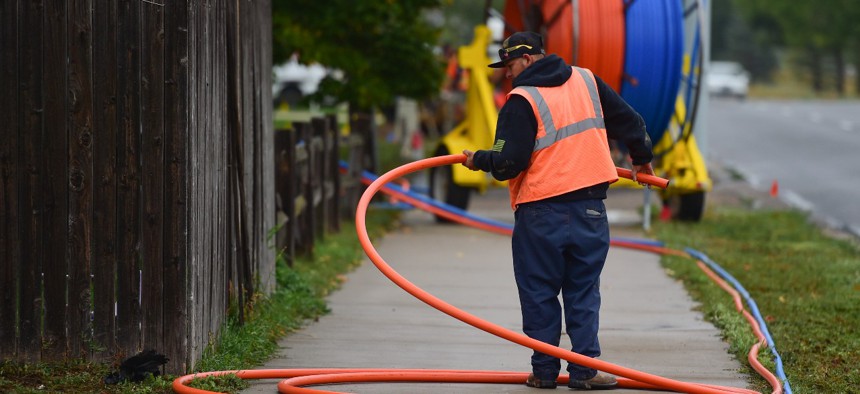A new federal proposal looks to take on digital redlining

Matt Jonas/Digital First Media/Boulder Daily Camera via Getty Images
The rules, which observers anticipate will be challenged in court, would allow the FCC to penalize broadband companies for providing poorer service to low-income customers.
In trying to address digital redlining, Jessica Rosenworcel, chair of the Federal Communications Commission, proposed new rules Wednesday that could give the agency the power to begin penalizing broadband companies if their policies, including how much they charge, lead to residents in richer neighborhoods having better service than those in poorer ones.
Groups representing the nation’s cities were still reviewing the 218-page document detailing the proposal. But the FCC’s effort to deal with digital discrimination and redlining is “a critical opportunity to address the historic inequities that have been perpetuated by discriminatory broadband buildout, maintenance or upgrade, and marketing,” the National League of Cities said in a letter to the FCC in February.
The proposal, which is expected to be passed by the FCC at a meeting next month, establishes rules prohibiting digital discrimination, allows the agency to investigate instances of it, creates a process to receive consumer complaints, and adopts best practices to support state and local efforts to combat digital redlining.
In addressing the role of states and cities, Rosenworcel said at an event on Tuesday that the FCC “strongly encourages” them to follow several recommendations made by an FCC task force late last year, including letting more people know about affordability programs.
The impetus for the new rules is a little-known provision tucked into the 2021 bipartisan infrastructure law that requires the FCC by Nov. 15 to identify “necessary steps” to eliminate discrimination based on income level, race, ethnicity, color, religion or national origin and “ensure that all people of the United States benefit from equal access to broadband internet service.”
Observers anticipate that the new rules will be challenged in court by the broadband industry, which sees them as government overreach.
“The industry is going to freak out,” said Gerard Lederer, a broadband expert for the U.S. Conference of Mayors and a partner at the law firm Best Best & Krieger.
At the event on Tuesday, Rosenworcel emphasized that there’s no evidence that broadband providers intentionally provide lower-quality service to disadvantaged communities.
But, she added, because of decades-old business policies and practices, “many of the communities that lack adequate access to broadband today are the same areas that suffer from longstanding patterns of residential segregation and economic disadvantage.”
Civil rights and broadband advocates have for years accused broadband companies of installing or maintaining higher-quality broadband in richer areas where they can make higher profits.
An analysis last October by The Markup and the Associated Press found that four major broadband companies charged the same rates to people in areas with slow broadband speeds as those in areas with faster speeds. Many of the neighborhoods with slower service were in areas that had been redlined, the discriminatory practice that denies services to those living in low-income areas with significant numbers of racial and ethnic minorities.
One solution that advocacy groups and the broadband industry are split on is whether broadband companies should be held accountable if their business decisions lead to disparities, regardless of their intent.
Civil rights and broadband advocates think they should. The National League of Cities, in comments to the FCC, argues that “digital discrimination should be defined by the impacts experienced by consumers, not the intent of a broadband provider to discriminate.”
“To show there was a discriminatory intent on the part of the carrier basically means no carrier would ever be charged unless you were able to find some hidden memo,” said Lederer of the U.S. Conference of Mayors.
In the letter it sent the FCC in February, the National League of Cities also argued that cities should be given more oversight authority. “Local permitting, local franchising, and locally managed rights of way are a critical tool for communities to hold the broadband providers that do business there accountable for their treatment of those communities,” it said.
For its part, the industry argues that it should only be held liable if companies intentionally provide poorer service in certain areas because of discrimination.
NCTA—The Internet & Television Association, a broadband industry group, had no immediate comment.
Rosenworcel, though, said she was taking a “fair and reasonable” approach. Under the proposal, companies will face penalties regardless of intent. But the FCC will excuse companies if they can show they are not providing the same level of service in some areas because of “technical and economic feasibility,” she said.
State and local governments can also help broadband companies avoid penalties by working with them to “help solve these problems before they even get to the FCC,” Rosenworcel said.
The new rules include a series of steps states and localities can take. They are not required to take action, but Nicol Turner Lee, the task force’s vice chair and director of the Brookings Institution’s Center for Technology Innovation, told Route Fifty in December that the steps would put pressure on governments to address inequity.
Among the recommended steps are increasing digital learning in K-12 and letting more low-income people know about programs like the Affordable Connectivity Program, which gives low-income families a $30-a-month subsidy to pay for broadband service.
In her remarks, Roseworcel noted that funding the program will soon run out unless Congress approves more in the spending bill due Nov. 17. President Joe Biden on Wednesday asked Congress to approve $6 billion in funding to keep the program running through next December.TkTkTk
NEXT STORY: Why cities should consider roundabouts






